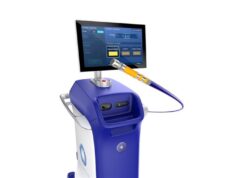
St. Jude Medical has announced the first patient enrolment in the STAR-VT (Substrate targeted ablation using the FlexAbility ablation catheter system for the reduction of ventricular tachycardia) clinical trial, a prospective, multicentre, randomised study evaluating the safety and efficacy of the FlexAbility ablation catheter when used in ventricular tachycardia (VT) ablation procedures.
The STAR-VT trial will assess whether combining targeted ablation with either an implantable cardiac defibrillator (ICD) or cardiac resynchronisation therapy defibrillator (CRT-D) can reduce the incidence and economic burden of recurring ventricular arrhythmias better than treatment with either an ICD or CRT-D and medication alone.
“For many years, implantable cardioverter defibrillators have been one of the primary treatment options for patients with ventricular arrhythmias,” said Andrea Natale, executive medical director at the Texas Cardiac Arrhythmia Institute. “While these are life-saving therapies, patient risks associated with the recurrence of ventricular tachycardia, such as frequent shocks from an implantable defibrillator, still exist. This study is important because it may provide further evidence that ablation therapies are more effective than medication in suppressing recurring ventricular tachycardia and, with it, the freedom from shocks and repeat cardiovascular hospitalisations for my patients.”
Patients who have ventricular tachycardia may not be able to maintain a normal blood pressure because of the heart’s inability to effectively pump blood throughout the body. If a normal heart rate is not restored, patients may experience episodes of loss of consciousness, or even sudden cardiac death. An implantable ICD or CRT-D detects this abnormal heart rhythm and delivers a small shock to the heart that is intended to restore a normal rhythm. Today, ICDs and CRT-Ds are an effective treatment option for nearly all patients with life-threatening ventricular tachycardias, but patients with recurring symptoms may need adjunctive treatment options, such as catheter ablation or medication, to prevent the heart from going into VT.
“While other studies have indicated that early ablation therapy can help prevent ventricular tachycardia recurrence and may reduce ICD shocks, a large randomised trial focusing on a high risk patient group has been needed to better assess the efficacy of this treatment option in order to reduce heart failure hospitalisations, mortality and health care costs,” said Srijoy Mahapatra, vice president of clinical, medical and scientific affairs at St. Jude Medical.
The STAR-VT trial will enrol an estimated 1,450 patients at approximately 50 centres in the USA. International centres will also be included in the trial. All patients will receive an ICD or a CRT-D and will then be randomised 1:1 to either adjunctive treatment (ablation therapy) or control (routine drug therapy) groups. The anticipated enrolment duration is four to five years. The STAR-VT trial will evaluate the number of ICD or CRT-D interventions after one year post-procedure as well as the incidence of serious adverse events associated with catheter ablation within 30 days following the procedure. Other secondary endpoints will assess the reduction of emergency room visits and mortality rates for patients involved in the trial.









